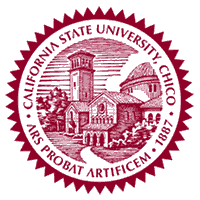October Presentations
The CSU Math Council Colloquia (MC2) series provides CSU faculty in mathematics, statistics, and mathematics education with the opportunity to network and share best practices in any topics related to university level mathematics and statistics education.
Innovation in the Math Major Curriculum
Hosts:
- Alfonso Agnew, Professor & Chair Department of Mathematics, CSU Fullerton, aagnew@fullerton.edu
Friday October 2nd [Zoom Link]
| Time | Name | Affiliation | Title | Abstract |
|---|---|---|---|---|
| 3:00 PM | Adam Glesser aglesser@fullerton.edu | Fullerton | Rethinking the Early Math Major Experience: Community, Creativity, and Content | In this talk, we will give context for significant changes made to our early math major classes at CSUF. Some of these are replacements (meant for math majors) for two of our existing calculus courses, while some are brand new courses. In all cases, these courses are meant to increase math major engagement and the feeling of community during the first two years, showcase more of the creativity inherent to studying mathematics, and to give them content specifically tailored for students who will be taking upper-division math courses. This talk will also discuss the importance of making some of these classes meaningful for transfer students who may have already taken all of the lower-division math courses. |
| 3:45 PM | Matthew Rathbun mrathbun@fullerton.edu | Fullerton | Strategies of Problem-Solving: Early exposure to critical thinking through games, puzzles, and the infinite | Strategies of Problem-Solving is one of three new courses introduced for early math majors at CSUF. This course is designed to be taken by students (or transfer students) during their first year with no prerequisite. This soon-to-be 4-unit course motivates creative and critical thinking through board games, puzzles, and paradoxes related to infinity. Without the expectation of rigorous proof, students learn the need for precision in language and reasoned arguments in the familiar context of games. This talk will discuss the course’s structure, a sample of the topics explored, and some of the impacts of the course. |
Friday October 16th [Zoom Link]
| Time | Name | Affiliation | Title | Abstract |
|---|---|---|---|---|
| 3:00 PM | Samuel Shen sshen@sdsu.edu | San Diego | Modernizing the higher mathematics: An integrated approach to calculus, linear algebra, statistics, data science, and computer programming | Undergraduate students majoring in engineering, physics, or geoscience often take about six courses on differential and integral calculus, linear algebra, basic statistics, and computer programming. These courses teach mathematics as a series of isolated and unrelated subjects. The curriculum has little relevance to a major such as electrical engineering, and the pace of learning mathematics is too slow to meet the needs of the courses in the major subjects. Present day students have difficulty to understand why mathematics is taught in this way. They are unable to see how mathematics is used in solving “real-world” problems in their major fields. So, how should we address the challenges and shortcomings of this current disconnected and time-consuming approach to learn mathematics? Taking the advantage of modern technology, we propose an approach of integrated learning of calculus, linear algebra, statistics, data science through computer programing. The modernized course may be named Higher Mathematics, or X Mathematics for major X, such as Climate Mathematics or Mechanical Engineering Mathematics. Using this approach, in 2019 we published an undergraduate textbook entitled “Climate Mathematics: Theory and Applications.” The book assumes only high school math background, includes materials of calculus, linear algebra, basic statistics, data science, and computer programming (R and Python), provides many datasets from NOAA and NASA, and can be taught in 1-3 semesters. Students can conveniently use the provided computer codes to reproduce almost all the figures in the book, which helps visualize the real-world data related to mathematical concepts, such as using the El Niño pattern to visualize an eigenvector in a 2592-dimensional space. This talk will present our experience with the integrated approach and the difficulties encountered. What we have done is only a small step forward. More questions are open: How do we develop and implement the curricula of Higher Mathematics or X Mathematics? How can we make a smooth transition from the current curricula to the new ones? How can we make it work in the California CC, CSU and UC system? Book materials: https://www.cambridge.org/climatemathematics |
| 3:50 PM | Brigitte Lahme lahme@sonoma.edu | Sonoma | Stretching Calculus: A Yearlong Calculus Class that Stretches Minds | Historically, calculus is a course with large opportunity gaps (with respect to GPA and persistence in STEM). Additionally, research shows that for students in STEM fields requiring calculus, taking pre-calculus does not lead to better success rates in calculus than starting in calculus without a dedicated pre-calc course (Sonnert & Sadler, 2014). At Sonoma State University, as part of the transition away from remediation, we developed and implemented a yearlong calculus I course for students who would have previously been placed into remedial courses. In this webinar, I will address the specific components of our stretch calculus program intended to make the learning environment more equitable and inclusive in order to better support first-year students. I will share preliminary results that indicate that the new approach is successful, including completion rates in calculus 1 and 2. Throughout our process of development and implementation, we have confronted several obstacles and challenges. From these, we make recommendations for other schools attempting such a model. |
Participating Institutions






